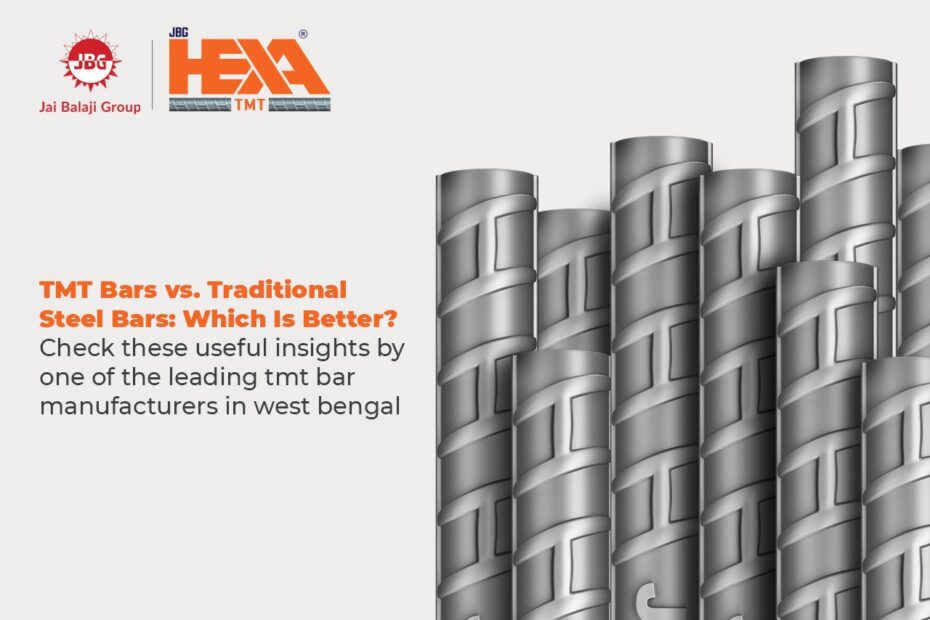In construction, concrete is often reinforced with steel to give it extra strength. Traditionally, mild steel bars were used for this purpose, but in recent years, Thermo-Mechanically Treated (TMT) bars have become the preferred choice. As one of the leading TMT bar manufacturers in West Bengal , we explore the differences between TMT bars and traditional steel bars:
Thank you for reading this post, don't forget to subscribe!Composition and manufacturing process
Traditional steel bars are made from mild steel, which is produced through a straightforward process. The steel is rolled at high temperatures and then allowed to cool slowly. This process doesn’t add much extra strength to the steel, leaving it with only the natural properties of the material. As a result, traditional steel bars tend to have lower tensile strength, which means they aren’t as strong when pulled or stretched. Also, these bars are more likely to corrode or rust over time.
TMT bars, however, are created through a more advanced process called thermo-mechanical treatment. This process involves rapidly cooling the outer layer of hot-rolled steel bars with water jets, while the inner core of the bar remains hot. This dual-stage process results in a bar that is both strong and flexible. The outer layer becomes hard and tough, while the core stays softer and more ductile, meaning it can bend without breaking. This combination of strength and flexibility is a significant improvement over traditional steel bars. Furthermore, TMT bars have a ribbed surface, which helps them bond better with concrete, enhancing the overall strength of the structure.
Strength and durability
One of the key advantages of TMT bars over traditional steel bars is their superior strength. TMT bars have a much higher tensile strength, which allows them to support more weight and withstand greater forces. This higher strength is particularly beneficial in modern construction, where buildings are getting taller and structures are becoming more complex. Using TMT bars means these ambitious designs can be achieved without compromising on safety.
Durability is another area where TMT bars excel. The unique cooling process used in their manufacturing makes them highly resistant to corrosion. Unlike traditional steel bars, TMT bars are less prone to rusting, which is especially important in environments with high humidity, such as coastal areas, or in places exposed to chemicals, like industrial sites. The reduced risk of corrosion means that structures built with TMT bars are likely to have a longer lifespan, requiring fewer repairs and less maintenance over time.
Ductility and flexibility
While strength is crucial, the ability of a material to bend or stretch without breaking—known as ductility—is equally important in construction. TMT bars are highly ductile due to their softer core, which allows them to bend without snapping. This flexibility is essential in areas prone to earthquakes or other forms of seismic activity. During an earthquake, a building needs to absorb and dissipate energy to prevent collapse. TMT bars, with their excellent ductility, help structures withstand these forces, reducing the risk of significant damage.
Traditional steel bars, on the other hand, are less ductile and more brittle. They are more likely to crack under stress, which can be a major disadvantage in earthquake-prone regions. The brittleness of traditional steel bars makes them less suitable for modern construction, where safety and durability are top priorities.
Cost-effectiveness
TMT bars might seem more expensive than traditional steel bars because of their slightly higher initial cost. However, when considering long-term benefits, TMT bars are more cost-effective. Their higher strength means that fewer bars are needed to achieve the same level of reinforcement, which can save materials and reduce costs. Moreover, because TMT bars are more resistant to corrosion, structures built with them will require less maintenance over time. This not only saves money but also extends the lifespan of the building, making TMT bars a wise investment in the long run.
Looking for reliable TMT bar manufacturers in West Bengal?
Explore our TMT steel bars . We are one of leading TMT bar manufacturers – we use specialized German Thermex Technology to treat the bars. Our TMT bars are designed to deliver unmatched strength, ductility, and reliability in every construction project. Engineered with a smooth finish, they ensure a flawless, aesthetically pleasing structure while offering high weldability to keep the construction solid and intact over time.
With fixed lengths, our TMT bars simplify the construction process. They reduce material wastage and make your work more efficient. They are also built to withstand the toughest conditions, providing superior earthquake resistance and high thermal resistance. This makes them ideal for areas prone to seismic activity or extreme temperatures.
At JBG HEXA, we take pride in being the leading provider of high-grade TMT steel bars in West Bengal, Bihar, and Jharkhand. Our commitment to quality has established us as a top steel manufacturer in Eastern India, delivering world-class steel products that meet the rigorous demands of modern construction.
